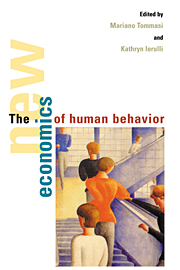Book contents
- Frontmatter
- Contents
- Contributors
- Preface
- Introduction
- PART I DISCRIMINATION AND IMMIGRATION
- PART II CRIME, PUNISHMENT, AND RIGHTS
- PART III ALL IN THE FAMILY
- PART IV GOVERNMENT AND POLITICS
- PART V HEALTH, RELIGION, AND MASS BEHAVIOR
- 10 The economic approach to addictive behavior
- 11 Household production, human capital, and the economics of religion
- 12 The blind leading the blind: social influence, fads, and informational cascades
- 13 Public health and economic epidemiology
- Index
10 - The economic approach to addictive behavior
Published online by Cambridge University Press: 03 December 2009
- Frontmatter
- Contents
- Contributors
- Preface
- Introduction
- PART I DISCRIMINATION AND IMMIGRATION
- PART II CRIME, PUNISHMENT, AND RIGHTS
- PART III ALL IN THE FAMILY
- PART IV GOVERNMENT AND POLITICS
- PART V HEALTH, RELIGION, AND MASS BEHAVIOR
- 10 The economic approach to addictive behavior
- 11 Household production, human capital, and the economics of religion
- 12 The blind leading the blind: social influence, fads, and informational cascades
- 13 Public health and economic epidemiology
- Index
Summary
Introduction
Much of Gary Becker's recent work has focused on the economic approach to addictive behaviors, particularly harmfully addictive behaviors (Becker and Murphy, 1988; Becker, Grossman, and Murphy, 1991; Becker, 1992; Becker, Grossman, and Murphy, 1994; Chaloupka, Grossman, Becker, and Murphy, 1993). Examples of these behaviors are cigarette smoking; gambling; consumption of such illegal drugs as heroin, marijuana, and cocaine; and excessive alcohol use. As in almost every other study discussed in this book, Becker's research on addiction extends the boundaries of economics to an area usually reserved for another discipline — in this case, psychology.
Experimental studies of harmful addiction by psychologists have usually found reinforcement, tolerance, and withdrawal (Donegan, Rodin, O'Brien, and Solomon, 1983; Peele, 1985). Reinforcement means that greater current consumption of a good raises its future consumption. Tolerance means that given levels of consumption are less satisfying when past consumption has been greater. Withdrawal refers to the negative physical reaction and other losses in satisfaction as consumption is terminated. Becker incorporates these insights into an economic framework in which consumers are rational or farsighted in the sense that they anticipate the expected future consequences of their current actions to challenge the conventional wisdom that the consumption of harmfully addictive substances is not responsive to price.
- Type
- Chapter
- Information
- The New Economics of Human Behaviour , pp. 157 - 171Publisher: Cambridge University PressPrint publication year: 1995
- 6
- Cited by



